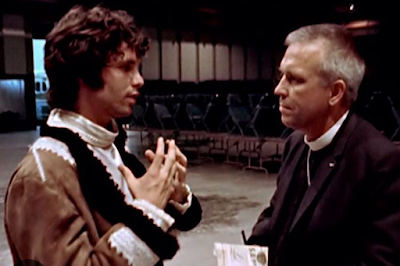THE DOORS’ "WHEN THE MUSIC'S OVER" AND RELIGION IN 1960s MUSIC
The Christian religion was an important reference point for American society in the 1960s.
The relationship between Pop-Rock and Rock, on the one
hand, and the Christian faith, on the other, was antagonistic for most of the
decade.
Indeed, the transgressive messages of many musicians
were condemned by most adults, with religious people in the
front row.
The Doors were no exception, becoming a target of the disapproval
that the more religious segment of Americans reserved for the best artists of
that generation.
On their second album, "Strange Days"
(September 1967), Jim Morrison poetically mentions Christian religion in "When
The Music's Over", a superlative song placed at the end of the LP.
"Cancel my subscription to the resurrection"
Morrison sings at min. 4.11 of this magnificent track; than he screams "Save
us! Jesus! Save us!" (at min. 8:43).
The verses we are referring to were written in a
polemical and irreverent vein toward the severe social habits and values promoted
by religious institutions.
Morrison’s target was not spirituality itself.
These lyrics’ fragments capture the polemical and desperate anger of a generation that saw an historical cultural change slowed down by the attitudes of political, social, and religious power centers.
Morrison's attitude toward the Christian religion is immortalized by an encounter he had with a Protestant pastor before (or after) a concert in 1968. As you can see, he was not disrespectful, but interested in confrontation and dialogue.
In addition to The Doors of "Strange Days",
other Rock or Pop-Rock groups of the same era also addressed religion through
their lyrics.
One example is given by The Strawbs, an English band
that included "The Man Who Called Himself Jesus", written by
bandleader Dave Cousins, on their debut album ("Strawbs", 1969).
It’s a beautiful Pop-Rock song that recounts the
return of Christ in the society of '69 through reflective and ironic episodes.
Note the melodies of the verse and chorus, both of good quality, supported in
an engaging way by the drums.
Another and more famous example is "Turn! Turn! Turn!" by the Byrds, released both as a single (#1 in the U.S.)
and on the band's second LP ("Turn! Turn! Turn!", December 1965).
This Folk-Rock cover of a 1962 Pete Seger Folk song is
notable for the sparkling guitar interplay of Roger McGuinn and David Crosby
and the fascinating melody depicted by the harmony vocals.
The lyrics of this composition are almost entirely
taken from the Book of Numbers, one of the Old Testament books of the Christian
Bible.
We have thus examined three examples of how religion
was perceived and expressed in 1960s Rock and Pop-Rock music.
They took us from The Doors' criticism wrapped in
poetry (with "When The Music's Over") to the Byrds' lyrics taken
directly from the Bible.
The Strawbs', on the other hand, gave us an ironic
reflection built upon the stark contradictions between the everyday world and
the original Gospel message in those years of great social change.




Comments
Post a Comment